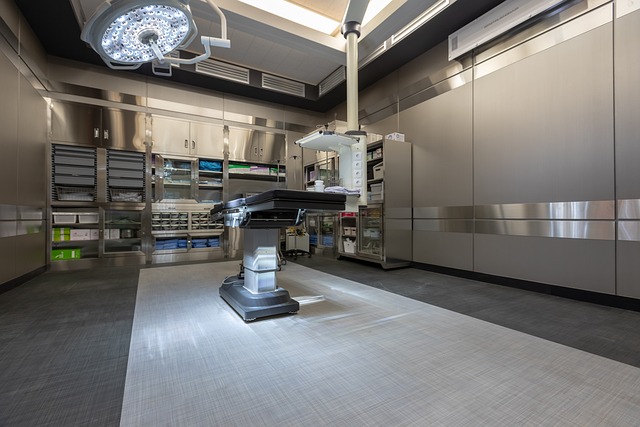Holistic diagnostic services are reshaping the healthcare landscape, offering a personalized approach to patient care. At the local hospital and clinic, these innovative services integrate advanced medical technology with a multidisciplinary team’s expertise, ensuring comprehensive health assessments tailored to individual needs. This article explores the transformative role of these diagnostic units within the hospital setting, the steps involved in holistic diagnosis, and the myriad benefits for patients seeking whole-person care. Join us as we delve into how this approach can revolutionize your healthcare experience at both the hospital and clinic levels.
- Unveiling the Comprehensive Approach of Holistic Diagnostic Services at the Local Hospital and Clinic
- The Role of Advanced Medical Technology in Personalized Care at the Hospital's Diagnostic Units
- A Closer Look at the Multidisciplinary Team Behind Your Customized Health Plan at the Clinic
- Navigating the Journey of Holistic Diagnosis: Steps and Benefits for Patients in a Hospital Setting
- Integrative Solutions: How Holistic Diagnostics at the Clinic Foster Whole-Person Care
Unveiling the Comprehensive Approach of Holistic Diagnostic Services at the Local Hospital and Clinic

The local hospital has pioneered a holistic diagnostic approach that transcends traditional medical practices, offering patients a more nuanced understanding of their health. By integrating advanced medical technology with a comprehensive evaluation of lifestyle factors, the hospital’s diagnostic services provide personalized care tailored to each individual’s unique needs. This approach ensures that healthcare professionals consider all facets of a patient’s well-being, including physical, psychological, and social elements, leading to more accurate diagnoses and effective treatment plans.
In parallel, the clinic complements the hospital’s efforts by offering accessible diagnostic services that cater to a diverse population. Utilizing cutting-edge diagnostic tools, the clinic’s healthcare providers work collaboratively to interpret a wide array of medical data, ensuring that patients receive comprehensive care that addresses both immediate and long-term health concerns. The integration of holistic diagnostic practices in both settings allows for a more cohesive and patient-centric approach to health management, fostering better outcomes and a higher quality of life for those under their care.
The Role of Advanced Medical Technology in Personalized Care at the Hospital's Diagnostic Units

Today, hospitals and clinics are leveraging advanced medical technology to revolutionize diagnostic services, offering personalized care that was once the realm of speculative fiction. The integration of cutting-edge imaging techniques like MRI and CT scans has enhanced the precision of diagnoses, allowing healthcare providers to tailor treatments to individual patient needs. These technologies provide high-resolution images that reveal the subtlest nuances of bodily structures, enabling early detection of diseases and more effective treatment plans. Moreover, the adoption of artificial intelligence in diagnostics is a game-changer, with algorithms capable of analyzing vast amounts of medical data to identify patterns that may elude human detectors. This AI-driven analysis contributes to more accurate diagnoses, reducing diagnostic errors and improving patient outcomes.
In addition to imaging advancements, modern hospitals and clinics are incorporating next-generation sequencing into their diagnostic workflows. This technology enables the rapid decoding of genetic material, offering insights into an individual’s unique genetic makeup. Such information is invaluable for predicting susceptibility to certain diseases, tailoring medication dosages, and developing personalized treatment protocols that consider a patient’s genetic predispositions. As a result, healthcare facilities equipped with these advanced tools are better positioned to deliver highly customized care, ensuring that each patient receives the most effective treatment based on their unique health profile.
A Closer Look at the Multidisciplinary Team Behind Your Customized Health Plan at the Clinic

At the heart of holistic diagnostic services lies a multidisciplinary team whose collaborative efforts are instrumental in crafting personalized health plans at the clinic. This team, a tapestry of medical professionals from various specialties, works cohesively to ensure a comprehensive approach to patient care. The clinic’s hospital environment is equipped with state-of-the-art facilities and technology that enable these experts to diagnose and treat a wide array of health conditions. From general practitioners to specialists such as cardiologists, oncologists, and neurologists, each member brings unique expertise to the table, creating a well-rounded care experience for patients. This multifaceted approach allows for the integration of diverse perspectives, ensuring that every aspect of a patient’s health is addressed. The team’s commitment to personalized medicine means that treatment plans are tailored to the individual needs and circumstances of each patient, enhancing the efficacy of care and promoting better health outcomes within the clinic’s supportive setting.
Navigating the Journey of Holistic Diagnosis: Steps and Benefits for Patients in a Hospital Setting

In a hospital or specialized clinic setting, holistic diagnostic services offer a comprehensive approach to patient care. These services begin with an initial consultation where medical professionals gather detailed information about a patient’s health history, lifestyle, and personal concerns. This thorough assessment enables healthcare providers to craft a tailored diagnostic plan that considers the physical, emotional, and mental aspects of the individual’s well-being. Subsequently, patients undergo a series of tests and evaluations designed to uncover not just the presence of disease or condition but also to understand the underlying factors contributing to their health status. Advanced imaging, laboratory analyses, and psychological assessments are often integrated to provide a complete picture of the patient’s health. This multifaceted approach ensures that any treatment plan developed is aligned with the individual’s unique needs, thereby enhancing the efficacy of interventions and improving overall health outcomes within a hospital or clinic environment. Patients who engage with these services often find themselves at the center of a collaborative care team, where each specialist contributes to a personalized care plan that addresses the whole person, not just their symptoms. This patient-centered model of diagnosis and treatment fosters an environment of trust and empowers individuals to take an active role in managing their health.
Integrative Solutions: How Holistic Diagnostics at the Clinic Foster Whole-Person Care

